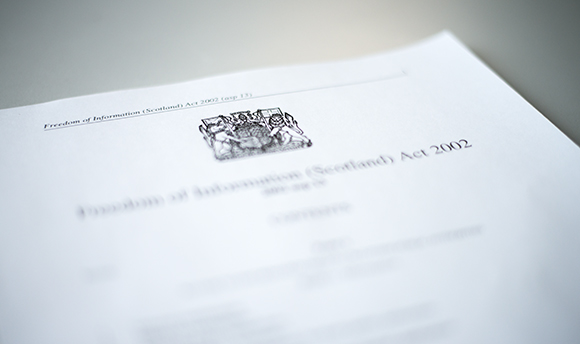Academic collaboration - formal collaborative agreements
A formal collaborative agreement is required for each programme leading to an award of the University. The agreement must be developed pre-validation and approved and signed by all parties before the programme can be offered.
8.1 A formal collaborative agreement is required for each programme leading to an award of the University. The agreement must be developed pre-validation and approved and signed by all parties before the programme can be offered.
8.2 No binding partnership links involving the provision of a programme, or a part of a programme, leading to an award of Queen Margaret University may be established by a constituent part of the University without the full knowledge and approval of the Academic Planning Board and Senate. No financial agreement should be made without going through the University’s standard costing and pricing approval procedures.
8.3 The respective responsibilities of the partner and QMU must be outlined in either a Memorandum of Agreement (where an award is being made in the name of the University), an Articulation Agreement (where there is provision for direct entry and/or preferential entry arrangements) or a Local Support Centre Agreement (where services are provided to QMU students at a distance from a QMU campus).
8.4 The agreement will be drafted by Governance and Quality Enhancement staff and circulated to all interested parties for comment. The financial agreement will be drafted in consultation between the relevant Dean and the Partnership Development Manager, with advice from the Director of Finance as required.
8.5 All parties, each to retain one original copy, must sign the agreement before a programme can be delivered.
8.6 The Agreement and financial appendix are subject to periodic review. This is undertaken by staff from the partner institution, the Collaborative Academic Lead, the Partnership Development Manager and the Dean or Head of Division.
8.7 Some of the key issues in collaborative agreements are discussed briefly below.
8.8 Admitting Students
8.8.1 Queen Margaret University will determine the admission requirements and acceptable entry qualifications for students joining a programme provided under a collaborative agreement, and will monitor the application of these requirements. Particular care will be taken with regard to any arrangements for the Recognition of Prior Learning (RPL). Queen Margaret University will also review information on student progression.
8.8.2 The University’s approval and monitoring procedures for entry requirements will ensure that:
- The partner organisation has details of the entry qualifications of all entrants to a programme;
- Queen Margaret University is able to monitor the entry qualifications of students against the agreed criteria.
8.8.3 Prior to admission, students of the partnership programme will receive details of:
- The intended outcomes of the programme;
- Admission and qualification requirements and any assumed experience or necessary access to particular learning resources;
- The time commitments required for study on the programme;
- The assessment methods that will be used;
- Guidance available should they wish to transfer to study at the Queen Margaret University;
- The opportunities to use Queen Margaret University’s learning and other resources (if applicable);
- Fees and incidental expenses and how and when these are to be paid;
- Welfare, guidance and support services available;
- The status of the student within Queen Margaret University and the entitlements that such status does or does not confer;
- The nature of the award involved and the information that a successful candidate would expect to have recorded on the award certificate and transcript;
- Named contacts at Queen Margaret University and the Partner Institution;
- Complaints, grievance and appeals procedures and how to make use of these.
8.8.4 Students must receive copies of the University regulations, normally by link to the University website.
8.8.5 In addition to the above, for arrangements involving overseas partners or intended specifically for overseas students, the following must be detailed:
- The language of instruction and assessment;
- Accurate information about the recognition of the programme or award in other countries or by professional and statutory bodies in the UK or elsewhere;
- For programmes involving study in more than one country, information about the features of studying in those countries, including information about costs.
8.9 Examination and Assessment
8.9.1 Examination and assessment arrangements provided under a collaborative arrangement must be devised so as to ensure that such awards are of an equivalent academic standard to those delivered by Queen Margaret University.
8.9.2 For franchised programmes, examination and assessment requirements must be the same as those required by Queen Margaret University when it delivers the programme itself.
8.9.3 For programmes delivered under a validation arrangement, the examination and assessment requirements must be equivalent to, and be as effective as, those employed by Queen Margaret University where it provides the same or comparable programmes.
8.9.4 Procedures must be in place to ensure that staff of the partner institution understand and abide by Queen Margaret University’s requirements for the conduct of assessments. This will include an agreed convention or protocol on invigilation, procedures to ensure the security of examination papers and to ensure that students undertaking an examination or assessment are those recorded as having completed that examination or assessment.
8.9.5 For all collaborative provision, QMU staff will moderate a sample of student work for the first full cohort. The sample size for moderation for each module will be at least the square root of the total number of students (rounded to the nearest whole number) taking the assessment plus all borderline fails. The sample should include a range of performance and the minimum size should be six pieces of assessed work. Moderation will continue for subsequent cohorts for as long as it is considered necessary by the host Division. This may be indefinitely.
8.9.6 Only the School Academic Board may decide whether to suspend or reduce moderation. This will be on the basis of a recommendation supported by an updated annual risk assessment. The Board must be satisfied that the partner has demonstrated the ability to mark in line with QMU’s standards and expectations and that this will continue in the coming academic year.
In making its decision, the Board will consider the level of risk to academic standards, and will take into account the following:
- Feedback from QMU moderators and external examiners
- Standards of student performance
- Whether there have been any significant changes to staffing or the programme
If the Board is satisfied that the level of risk is sufficiently low, they may enforce one of the following options:
- To continue moderation but reduce the sample size.
- To suspend moderation for certain specified modules but not others.
- To suspend moderation for an entire level of the programme but retain the right to moderate a defined number of random modules each year as an on-going check.
- To suspend moderation altogether for an entire level, levels, or all levels of the programme
If the Board is not fully satisfied, normal moderation will continue.
Clear records will be kept by the Division of Governance and Quality Enhancement regarding the moderation arrangements applicable to each programme. The School Academic Board will review annually the situation regarding moderation and may require it to recommence as set out below.
8.9.7 The risk status of the programme will be reviewed annually. This will include a review of the effectiveness of the moderation arrangements. In a programme where moderation has been reduced or suspended, it may become appropriate to resume full moderation. Reasons for re-starting full moderation might include:
- External examiners or internal moderators had raised concerns about the marking of a particular module or modules.
- Student performance had altered significantly.
- A significant change had been made to the module learning outcomes or assessment format.
- There had been a number of changes to staffing.
A recommendation to alter the moderation arrangements should be detailed on the risk assessment form and submitted to the School Academic Board, along with supporting evidence as appropriate. The School Academic Board will make the final decision.
8.9.8 Normally, moderation arrangements will apply for a full academic year. In the event of a sudden change that increases the level of risk, the Collaborative Academic Lead may ask the School Academic Board to reinstate full moderation during the course of an academic year.
8.9.9 The decision of the School Academic Board will be final. The University reserves the right to determine the moderation arrangements in proportion to the level of risk as part of its responsibility for the academic standards of the award. The University will not enter into correspondence with partner institutions regarding this decision.
8.9.10 Where programmes are taught and assessed in a language other than English, the provisions of Section Seventeen will apply.
8.9.11 Queen Margaret University will be responsible for the appointment of External Examiners, who will be appointed on the basis of criteria established by the University, details of which are set out in the section on External Examiners.
8.9.12 For arrangements involving an overseas partner, additional consideration must be given to:
- The experience and understanding of UK higher education, including the role of External Examiners, of individuals nominated to act as External Examiners;
- The desirability of appointing additional External Examiners to assist with the monitoring of the provision and to ensure an appropriate range of skills, expertise and experience.
- The availability of Examiners who are able to work in the language of instruction and assessment where this is not English.
8.9.13 Full advice on issues relating to External Examiners and examination procedures is available from GQE and Students Records staff.
8.10 Student Certification and Transcripts
8.10.1 The University Secretary will have sole access to, and be the only individual empowered to issue award certificates. Duplicate certificates will be issued only after staff of the University Secretary’s Group have undertaken detailed enquiries.
8.10.2 The wording and terminology on the Award Certificate will be consistent with those used by Queen Margaret University on certificates for comparable programmes delivered by the University.
8.10.3 Academic transcripts will record the location of delivery of the programme and the language of instruction, if not English. If the language of assessment was not the same as that used for the instruction, this should be clearly recorded on the certificate and transcripts. Only in very exceptional circumstance, will the language of instruction be other than English. (Visit Section Seventeen.) Award certificates will state that they are accompanied by an academic transcript.
8.11 Financial Arrangements
8.11.1 Appropriate financial arrangements should be detailed in the collaborative agreement between the University and the partner institution.
8.11.2 Validation and franchising arrangements will attract a fee, which will include charges for developing the programme and arranging the validation event. This fee is in addition to the annual fees payable. Some collaborations will also include a de minimis payment to cover the operating cost of the agreement.
8.11.3 Arrangements will also be put in place:
- To record and account for all transactions made in connection with the arrangements;
- To identify and respond to significant changes in the financial aspects of the arrangement in a way that will ensure that academic standards will not be compromised and the interests of students will be protected;
- For the authorisation of travel and subsistence arrangements for staff.
8.12 Information and Publicity
8.12.1 Misleading or inaccurate information about the nature of the collaborative link is harmful to all partners. Therefore mechanisms for the checking of promotional and publicity material produced by the partner institution will be established from the outset, and monitored during the lifetime of the collaborative agreement.
8.13 Termination of Agreement
8.13.1 Arrangements for the termination of a collaborative agreement by any party must take account of the need to provide for the interest of continuing students registered on the programme concerned.
8.13.2 The University reserves the right to terminate a collaborative agreement immediately if the collaborative partner is in serious breach of the terms of the Memorandum of Agreement i.e. that:
- It fails to make any payment in accordance with the provisions of the Financial Memorandum;
- It becomes insolvent or unable to pay its due debts or enters into any arrangement with its creditors or engages in any legal process approximate or equivalent to the appointment of a receiver or liquidator or any other condition reasonably describable as insolvency under the law of Scotland.
- A breach of material obligation has not been rectified to the complete satisfaction of Queen Margaret University within 28 days following service of a notice requiring such rectification.
8.13.3 Full detail of procedures for termination will be set out in the Memorandum of Agreement. Neither party will be permitted to admit further students to a collaborative programme once a termination notice has been served.


